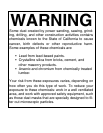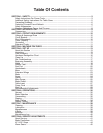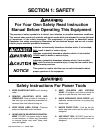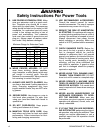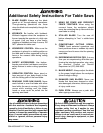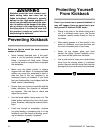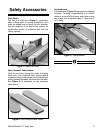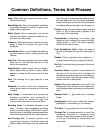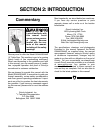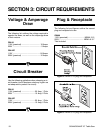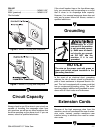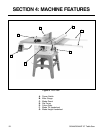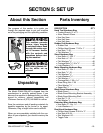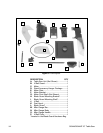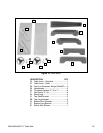
-8-
G0444/G0444Z 10" Table Saw
Common Definitions, Terms And Phrases
Arbor: Metal shaft that connects the drive mech-
anism to the blade.
Bevel Edge Cut: Tilting the saw arbor and blade
to an angle between 0° and 45° to perform an
angled cutting operation.
Blade Guard: Guard mechanism that mounts
over the saw blade to prevent accidental con-
tact with the cutting edge.
Crosscut: Table saw operation in which the miter
gauge is used to cut across the grain of the
workpiece.
Dado Blade: Blade or set of blades that attach to
the arbor and are used for cutting grooves and
rabbets.
Dado Cut: Table saw operation that uses a dado
blade to cut a flat bottomed groove into the
face of the workpiece.
Featherboard: Safety device used to keep a
board against the rip fence or table. Allows
operator to keep hands away from the saw
blade.
Kerf: The resulting cut or gap made by a saw
blade.
Kickback: An event in which the workpiece is
thrown back toward an operator at a high rate
of speed.
Miter Gauge: A component that controls the
workpiece movement while performing a
crosscut. Allows for variation of angle cuts
such as miter cuts used on a picture frame.
Moulding Head: A cutterhead attached to the
arbor. Accepts interchangeable moulding
knives for profile cutting. We DO NOT recom-
mend the use of moulding heads because they
require advanced skills for their safe operation.
Non-Through Cut: A sawing operation that
requires the removal of the blade guard and
splitter. Dado and rabbet cuts are considered
Non-Through Cuts because the blade does not
protrude above the top face of the workpiece.
Always remember to re-install the blade guard
and splitter after performing a non-through cut.
Parallel: Being an equal distance apart at every
point. i.e. the rip fence face is parallel to the
side face of the saw blade.
Perpendicular: Intersecting and forming right
angles; at right angles to the vertical and hori-
zontal planes. i.e. at 90˚ the blade is perpen-
dicular to the table surface.
Push Paddle/Push Stick: Safety aid used to
push the workpiece through the cutting opera-
tion.
Rabbet: Cutting operation that creates an L-
shaped channel along the edge of the board.
Rip Cut: A cut made along the grain of the work-
piece.
Sacrificial Fence: A piece of wood attached to
the face of the rip fence that is designed to
extend the fence face away from the metal por-
tion of the fence. Used primarily when making
rabbet cuts with a dado blade.
Splitter: Metal plate attached to the back of the
blade guard that maintains the kerf opening in
the workpiece when performing a cutting oper-
ation.
Standard Kerf:
1
⁄8" gap made with a standard
blade.
Straightedge: A tool used to check the flatness,
parallelism, or consistency of a surface(s).
Thin Kerf:
3
⁄32" gap made with a thin kerf blade.
Through Cut: A sawing operation in which the
workpiece thickness is completely sawn
through. Proper blade height usually allows
1
⁄4"
of the top of the blade to extend above the
wood stock.



